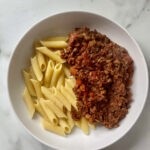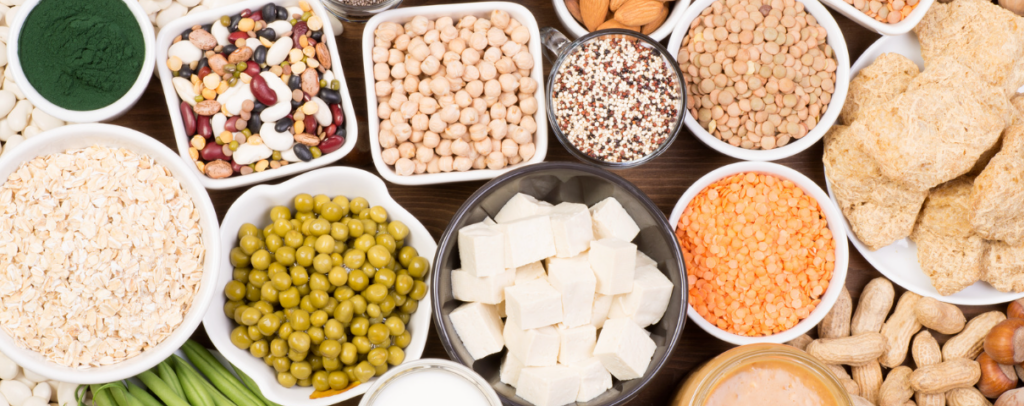
Lentil & Walnut Bolognese
July 9, 2024
Physical Environment & Performance
July 16, 2024
Lentil & Walnut Bolognese
July 9, 2024
Physical Environment & Performance
July 16, 2024Power Up with Plants: How to Achieve Your Protein Goal on a Vegan Diet
Summary:
- Role of protein in the diet
- Recommended protein intake
- Protein availability in plant-based foods
- High protein plant-based food sources
- Plant-based high-protein recipes
Introduction:
In recent years vegan diets have gained a lot of spotlight. People may opt to follow a vegan diet due to environmental concerns, the rising costs of food, animal rights, or food intolerances. While following a vegan diet can have many benefits such as including a variety of fruits and vegetables that are high in fibre, vitamins, minerals and antioxidants, it may be difficult to reach your protein target. Animal products are the richest source of protein in an omnivorous diet. When animal-based foods are omitted from the diet, a conscious effort has to be made to ensure that protein requirements are met. With that being said, some of the world’s most successful athletes follow a vegan diet, including boxer David Haye and tennis champion Venus Williams. You can level up your performance too by following a vegan diet, but it may require a little extra planning and preparation.
What is a vegan diet?
‘’A vegan diet is based on plants (such as vegetables, grains, nuts and fruits) and foods made from plants’’ (NHS, 2022). It has been found that individuals who follow a vegan diet consume less protein than those who consume vegetarian or omnivorous diets (Venderley and Campbell, 2006).
What is protein?
Protein is one of the three macronutrients in the diet (carbohydrates and fats are the other two macronutrients). Proteins are made up of chemical ‘building blocks’ called amino acids. Your body uses amino acids to build and repair muscles and bones and to make hormones and enzymes. Protein also provides a source of energy for cells of the immune system. So it is safe to say that protein plays a vital role in almost every biological process in the body and is an essential part of the diet.

There are 20 amino acids (protein building blocks). Some of these amino acids are made in the body (non-essential) while other amino acids must be obtained through our food (essential). Many animal-based protein sources (meat, fish and dairy products) contain all the essential amino acids needed. However, when we look at plant-based protein sources, there may be one or more of the essential amino acids missing. For this reason, consuming a variety of plant proteins throughout the day is important to achieve a wide variety of these essential amino acids.

How much protein do I need?
The World Health Organisation (WHO) suggests that 0.8g/kg body weight prevents deficiency. But is that optimal, especially for individuals who are physically active? The American College of Sports Medicine (ACSM) states that 1.2g-2.0g/kg body weight is recommended (LM., 2016). However, to help with muscle adaptations that occur with exercise (ie. incorporating both endurance and resistance training), protein intakes of 1.7-2.2g/kg body weight are recommended (Chapman et al., 2021). For example, an athlete weighing 70kg that included both resistance and endurance training in their exercise regimen should aim for a protein intake of 119-154g of protein distributed evenly across the day (70kg x 1.7-2.2g).
When it comes to plant-based foods that are high in protein, it can be difficult to know which items to put in your shopping basket. Below are some examples of foods to add to your weekly shopping to ensure that you are in the best position to meet your protein requirements.

Supplements
When it comes to supplementation, we generally recommend going with a ‘food first’ approach. By eating a wide range of different foods, you give yourself the best chance to consume a wide variety of different vitamins and minerals that the body needs. However, we do understand that it can still be difficult to achieve your protein requirements, particularly as a vegan athlete. Protein powders can be an effective way to supplement your diet and can be used in a variety of different ways. There are several different types of protein powders available on the market, including ones suitable for individuals who follow a vegan diet. To read more about the different types of protein powders, take a look at our blog all about protein powders.
Now that you know why you need protein, how much you need, and what the different high-protein plant-based foods are – what next? Being able to make delicious and satisfying meals that provide you with energy and are high in protein is essential to help you reach your protein requirements consistently. Navigating the right recipes for you can be a challenge, but start by looking at a few of our delicious high-protein vegan dishes below.

- Chickpea & Lentil Curry
- Vegan Protein Shake
- Sweet Potato & Chickpea Satay

- Tofu & Mixed Bean Chilli
- Vegan Chocolate Cookies
Is it possible to transition to a vegan diet while playing at an elite level?In 2021, I was involved in a study that looked into whether a Gaelic football player could transition to a vegan diet and maintain their elite level of performance without compromising their body composition (Davey, Malone and Egan, 2021). With a considerable amount of planning, the athlete was able to reach the upper-end recommended protein intake (1.9g/kg body weight) while following a vegan diet. It was found that there was no significant difference in their running performance after switching to a vegan diet and body composition was maintained throughout. However, this athlete had support from a multidisciplinary team during this transition. It can be difficult to navigate how much protein your body needs and how to build your meals to achieve this as everyone has different goals. It can make a big difference to have the correct kind of support to make sure your body is getting all the nutrients it needs when following a vegan diet. At daveynutrition, customisable meal plans that are tailored towards you and your goals can help guide you in the right direction. Join our monthly or annual membership to take a look at some more of our delicious vegan recipes and have the support and guidance from our expert team.

In conclusion, achieving your protein goals while following a plant-based diet is not only possible but also has many health advantages. By incorporating a wide variety of plant-based foods that are high in protein, such as legumes, nuts, seeds, and whole grains, you can reach your protein requirements and start performing at your best.
References
Chapman S., Chung H.C., Rawcliffe A.J., Izard R., Smith L., Roberts J.D. Does protein supplementation support adaptations to arduous concurrent exercise training? A systematic review and meta-analysis with military based applications. Nutrients. 2021;13(5):1416. doi: 10.3390/nu13051416.
Davey, D., Malone, S. and Egan, B. (2021) ‘Case Study: Transition to a vegan diet in an elite male Gaelic football player,’ Sports, 9(1), p. 6. https://doi.org/10.3390/sports9010006.
LM., T.D.K. (2016) American College of Sports Medicine Joint Position Statement. nutrition and athletic performance, Medicine and science in sports and exercise. Available at: https://pubmed.ncbi.nlm.nih.gov/26891166/ (Accessed: 04 July 2024).
NHS (2022) The Vegan Diet, NHS choices. Available at: https://www.nhs.uk/live-well/eat-well/how-to-eat-a-balanced-diet/the-vegan-diet/
Venderley, A.M. and Campbell, W.W. (2006) ‘Vegetarian diets,’ Sports Medicine, 36(4), pp. 293–305. https://doi.org/10.2165/00007256-200636040-00002.
Power Up with Plants: How to Achieve Your Protein Goal on a Vegan Diet
Summary:
- Role of protein in the diet
- Recommended protein intake
- Protein availability in plant-based foods
- High protein plant-based food sources
- Plant-based high-protein recipes
Introduction:
In recent years vegan diets have gained a lot of spotlight. People may opt to follow a vegan diet due to environmental concerns, the rising costs of food, animal rights, or food intolerances. While following a vegan diet can have many benefits such as including a variety of fruits and vegetables that are high in fibre, vitamins, minerals and antioxidants, it may be difficult to reach your protein target. Animal products are the richest source of protein in an omnivorous diet. When animal-based foods are omitted from the diet, a conscious effort has to be made to ensure that protein requirements are met. With that being said, some of the world’s most successful athletes follow a vegan diet, including boxer David Haye and tennis champion Venus Williams. You can level up your performance too by following a vegan diet, but it may require a little extra planning and preparation.
What is a vegan diet?
‘’A vegan diet is based on plants (such as vegetables, grains, nuts and fruits) and foods made from plants’’ (NHS, 2022). It has been found that individuals who follow a vegan diet consume less protein than those who consume vegetarian or omnivorous diets (Venderley and Campbell, 2006).
What is protein?
Protein is one of the three macronutrients in the diet (carbohydrates and fats are the other two macronutrients). Proteins are made up of chemical ‘building blocks’ called amino acids. Your body uses amino acids to build and repair muscles and bones and to make hormones and enzymes. Protein also provides a source of energy for cells of the immune system. So it is safe to say that protein plays a vital role in almost every biological process in the body and is an essential part of the diet.

There are 20 amino acids (protein building blocks). Some of these amino acids are made in the body (non-essential) while other amino acids must be obtained through our food (essential). Many animal-based protein sources (meat, fish and dairy products) contain all the essential amino acids needed. However, when we look at plant-based protein sources, there may be one or more of the essential amino acids missing. For this reason, consuming a variety of plant proteins throughout the day is important to achieve a wide variety of these essential amino acids.

How much protein do I need?
The World Health Organisation (WHO) suggests that 0.8g/kg body weight prevents deficiency. But is that optimal, especially for individuals who are physically active? The American College of Sports Medicine (ACSM) states that 1.2g-2.0g/kg body weight is recommended (LM., 2016). However, to help with muscle adaptations that occur with exercise (ie. incorporating both endurance and resistance training), protein intakes of 1.7-2.2g/kg body weight are recommended (Chapman et al., 2021). For example, an athlete weighing 70kg that included both resistance and endurance training in their exercise regimen should aim for a protein intake of 119-154g of protein distributed evenly across the day (70kg x 1.7-2.2g).
When it comes to plant-based foods that are high in protein, it can be difficult to know which items to put in your shopping basket. Below are some examples of foods to add to your weekly shopping to ensure that you are in the best position to meet your protein requirements.

Supplements
When it comes to supplementation, we generally recommend going with a ‘food first’ approach. By eating a wide range of different foods, you give yourself the best chance to consume a wide variety of different vitamins and minerals that the body needs. However, we do understand that it can still be difficult to achieve your protein requirements, particularly as a vegan athlete. Protein powders can be an effective way to supplement your diet and can be used in a variety of different ways. There are several different types of protein powders available on the market, including ones suitable for individuals who follow a vegan diet. To read more about the different types of protein powders, take a look at our blog all about protein powders.
Now that you know why you need protein, how much you need, and what the different high-protein plant-based foods are – what next? Being able to make delicious and satisfying meals that provide you with energy and are high in protein is essential to help you reach your protein requirements consistently. Navigating the right recipes for you can be a challenge, but start by looking at a few of our delicious high-protein vegan dishes below.

- Chickpea & Lentil Curry
- Vegan Protein Shake
- Sweet Potato & Chickpea Satay

- Tofu & Mixed Bean Chilli
- Vegan Chocolate Cookies
Is it possible to transition to a vegan diet while playing at an elite level?In 2021, I was involved in a study that looked into whether a Gaelic football player could transition to a vegan diet and maintain their elite level of performance without compromising their body composition (Davey, Malone and Egan, 2021). With a considerable amount of planning, the athlete was able to reach the upper-end recommended protein intake (1.9g/kg body weight) while following a vegan diet. It was found that there was no significant difference in their running performance after switching to a vegan diet and body composition was maintained throughout. However, this athlete had support from a multidisciplinary team during this transition. It can be difficult to navigate how much protein your body needs and how to build your meals to achieve this as everyone has different goals. It can make a big difference to have the correct kind of support to make sure your body is getting all the nutrients it needs when following a vegan diet. At daveynutrition, customisable meal plans that are tailored towards you and your goals can help guide you in the right direction. Join our monthly or annual membership to take a look at some more of our delicious vegan recipes and have the support and guidance from our expert team.

In conclusion, achieving your protein goals while following a plant-based diet is not only possible but also has many health advantages. By incorporating a wide variety of plant-based foods that are high in protein, such as legumes, nuts, seeds, and whole grains, you can reach your protein requirements and start performing at your best.
References
Chapman S., Chung H.C., Rawcliffe A.J., Izard R., Smith L., Roberts J.D. Does protein supplementation support adaptations to arduous concurrent exercise training? A systematic review and meta-analysis with military based applications. Nutrients. 2021;13(5):1416. doi: 10.3390/nu13051416.
Davey, D., Malone, S. and Egan, B. (2021) ‘Case Study: Transition to a vegan diet in an elite male Gaelic football player,’ Sports, 9(1), p. 6. https://doi.org/10.3390/sports9010006.
LM., T.D.K. (2016) American College of Sports Medicine Joint Position Statement. nutrition and athletic performance, Medicine and science in sports and exercise. Available at: https://pubmed.ncbi.nlm.nih.gov/26891166/ (Accessed: 04 July 2024).
NHS (2022) The Vegan Diet, NHS choices. Available at: https://www.nhs.uk/live-well/eat-well/how-to-eat-a-balanced-diet/the-vegan-diet/
Venderley, A.M. and Campbell, W.W. (2006) ‘Vegetarian diets,’ Sports Medicine, 36(4), pp. 293–305. https://doi.org/10.2165/00007256-200636040-00002.
Upgrade NOW
Upgrade NOW






